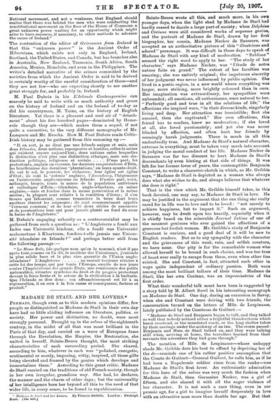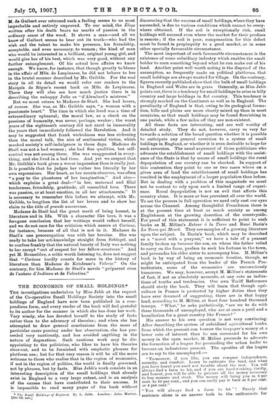MADAME DE STAEL AND HER LOVERS.*
PERHAPS, though even as to this modern opinions differ, few people so distinguished as Madame de Steel in their own day have had so little abiding influence on literature, politics, or society. Her power and distinction, no doubt, were most strongly personal. Brought up in the salons of the eighteenth century, in the midst of all that was most brilliant in the Paris of that day, and carried on a wave of European fame through the Revolution, the Empire, the Restoration, she united in herself, Sainte-Beuve thought, the most striking characteristics of each succeeding period. She shared, according to him, whatever in each was "polished, energetic, sentimental or manly, imposing, witty, inspired, all these gifts being elevated and framed by the genius which develops and immortalises them." According to this great critic, Madame de Stael carried on the traditions of old French society, though in her own irregular, grandiose way. She had, he declares, the manner and the charm of other days ; but the universality
her intelligence bore her beyond all this to the need of that wider life, in every sense, to be found in republicanism.
• Madame de StaM and her Lavers. By Francis Gribble. London : Eveleigh Weida. [15e. neta Sainte-Benve wrote all this, and ranch more, in his own younger days, when the light shed by Madame de Steel had hardly ceased to dazzle a large part of society ; when Delphise and Corinne were still considered works of supreme genius, and the portrait of Madame de Sta.61, drawn by her first biographer, her cousin, Madame Necker de Saussure, was accepted as an authoritative picture of this "illustrious and adored" personage. It was difficult in those days to speak of Madame de Stael with any kind of moderation. " Sublime " seemed the right word to apply to her. "The study of her character," says Madame Necker, was " l'etude de notre nature faite en grand." The extent of her faculties was amazing; she was entirely original ; the impetuous sincerity of her judgment was never influenced by public opinion. She lived in a poetic region, in a new world where everything was larger, more striking, more brightly coloured than in ours. Her imagination was extraordinary, her sympathies were unbounded; all emotions, all enthusiasms, were natural to her.
"Perfectly good and true in all the relations of life," the affections she inspired were, "in their diverse kinds, singularly living and deep. Her attraction was irresistible ; first she amazed, then she captivated." Her own affections, this friend has to confess, knew no modevation ; if she loved at all, she loved passionately; and yet she was never blinded by affection, and often hurt her friends by seemingly harsh judgments. There is much in all thie undoubtedly true. And Madame de Stael's natural character, extreme in everything, must be taken very much into account in judging the moral conduct of her life. Madame Necker de Saussure was far too discreet to hurt Madame de Stael's descendants by even hinting at that side of things. It was left for her former lover of years, the contemptible Benjamin Constant, to write a character-sketch in which, as Mr. Gribble says, "Madame de Stael is depicted as a woman who always does what she wishes to do, and always believes that whatever she does is right."
That is the view which Mr. Gribble himself takes, in thie book devoted, one may say, to Madame de Stael in love. He may be justified in the argument that the one thing she really cared for in life was to love and to be loved : "not merely to achieve happiness, but to impart it." Such an argument, however, may be dwelt upon too heavily, especially when it is chiefly based on the miserable Journal Intime of one of the meanest geniuses who ever gained the affections of generous but foolish woman. Mr. Gribble's study of Benjamin Constant is curious, and a good deal of it will be new to English readers. But as to any sympathy with the character and the grievances of this weak, vain, and selfish creature, we have none. Our pity is for the remarkable woman who allowed herself to be bound in such chains, and was too true of heart ever really to escape from them, even when other ties existed. She and Constant, in fact, attracted each other in ways quite independent of ordinary passion. Both were among the most brilliant talkers of their time. Madame de Stael, like her own Corinne, was an improvisatrice of the first order.
What their wonderful talk must have been is suggested by
a story told by M. Albert Sorel in his interesting monograph on Madame de Stael. One day, during an excursion in Savoy, when she and Constant were driving with two friends, the conversation turned on the letters of Mlle. de Lespinasse, lately published by the Comtesse de Guibert:— "Madame de Stael and Benjamin began to talk, and they talked so well that nobody noticed either a frightful thunderstorm which burst overhead, or the inundated roads, or the long shelter taken by their carriage under the archway of an inn. The storm passed: Benjamin and Mme. de Steel talked on, and they wore talking still when, arriving at home, the travellers learned from their servants the adventure they had gone through."
The mention of Mlle. de Lespinasse—whose unhappy shade Mr. Gribble dods his best to offend by depriving her of the de—reminds one of his rather positive assumption that the Comte de Guibert—General Guibert, he calls him, as if he had been a Napoleonic soldier risen from the ranks—was Madame de Stael's first lover. An enthusiastic admiration for this hero of the salons was very much the fashion when Madame de Steel, then Germaine Necker, was a girl of fifteen, and she shared it with all the eager violence of her character. It is not such a rare thing, even in our prosaic age, for a girl to imagine herself desperately in love with an attractive man more than double her age. But that
M. de Guibert ever returned such a feeling seems to us most improbable and entirely unproved. To our mind, the .'loge written after his death bears no marks of passion in the ordinary sense of the word. It shows a man—and all we know of Guibert seems to bear out its truth—who had the wish and the talent to make his presence, his friendship, acceptable, and even necessary, to women; the kind of man who would be interested in a brilliant, original young girl, and would give her of his best, which was very good, without any further entanglement. Of his actual love affairs we know enough. We know, for instance, that though greatly to blame in the affair of Mlle. de Lespinasse, he did not behave to her in the brutal manner described by Mr. Gribble. For the real story in all its detail we would refer our readers to the Marquis de Segues recent book on Mlle. de Lespinasse. There they will also see how much justice there is in describing the unhappy Julie as " d'Alembert's mistress."
But we must return to Madame de Steel. She had lovers, of course. She was, as Mr. Gribble says, "a woman with a passionate heart." The time in which she lived was a time of extraordinary upheaval; the moral law, as a check on the passions of humanity, was never, perhaps, weaker ; the worst years of the eighteenth century did not excel in immorality the years that immediately followed the Revolution. And it may be suggested that frank wickedness was less sickening than the moral talk, the airs of sentimental virtue, which masked society's self-indulgence in those days. Madame de Stael was not a bad woman ; she had fine qualities, but self- control was not among them. She was exaggerated in every- thing, and she Jived in a bad time. And yet we suspect that Mr. Gribble's book gives a worse impression than is really just. It is possible that he judges her rather too literally by her own expressions. Her heart, as her cousin observes, was often " a prey to the phantoms of her imagination." And also— which explains a great deal—" in her, maternal and filial tenderness, friendship, gratitude, all resembled love. There was passion, or at least emotion, in all her attachments." It is necessary to remember this before we attempt, with Mr. Gribble, to lengthen the list of her lovers and to show her claim to the title of grande amoureuse.
Madame de Steel had the great merit of being honest, in literature and in life. With a character like hers, it was a foregone conclusion that her writings would reflect herself, and we do not care for the criticism which sneers at Corinne, for instance, because of all that is not in it. Madame de Steel's one preoccupation was with her heroine. She was ready to take her art-knowledge straight from Schlegel, and to confess frankly that the natural beauty of Italy was nothing to her except "out of respect for her fellow-creatures." And yet M. Brunetiere, a critic worth listening to, does not suggest that "Corinne hardly counts for more in the history of literature than Madame de Kriidenees Valerie." On the contrary, for him Madame de Steel's novels " proparent ceux de l'auteur d'Indiana et de Valentine."







































 Previous page
Previous page